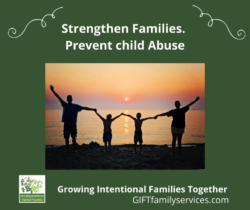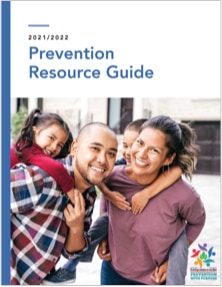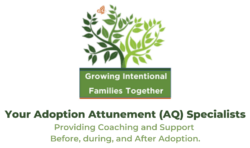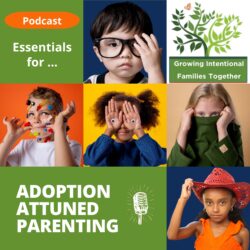 April is National Child Abuse Prevention Month and is intended to prevent child abuse as well as raise awareness of it. Both are worthy goals. Growing Intentional Families Together supports them.
April is National Child Abuse Prevention Month and is intended to prevent child abuse as well as raise awareness of it. Both are worthy goals. Growing Intentional Families Together supports them.
So, what can we do to prevent child abuse?
An obvious first step is to “say something” if you see “something.” In most of the more notorious cases of child abuse, many people were suspicious that abuse might be happening. Some actually knew this to be the case but did not want to get involved. What got in the way of speaking up? Usually, it was a reluctance to get entangled in an investigation, fear of retaliation, or worry that it would cause strife between extended family or friends. Some do not call authorities because they do not want the family to be separated and have the children enter foster care.
For folks who hesitate to speak up because they fear the children enter foster care, they may fear that it will not be temporary. They anticipate that it will lead to the permanent separation of the child from his family. They recognize that this separation will always be traumatic for the child. And, in their estimation, foster care will not offer a better situation. (Unfortunately, this is sometimes true.)
Of course, we want children to be safe and well cared for which may lead to the need for foster care in certain circumstances. We also want to be sure that the decision to place a child in foster care is not more damaging than the current crisis situation. Sometimes, what a family actually needs is support in the form of food assistance, housing vouchers, transportation, or childcare. For example, single parents can’t leave their little ones home alone while she goes to work to earn the money to provide food and shelter.
Hunger, substandard housing, and homelessness do not mean that the family lacks solid attachment. Whether rich or poor, with access to resources or lacking access, parents love their kids. Statistics show that too often we equate the realities of poverty as equivalent to abuse. Based on this assumption, children are removed with little weight given to the very significant toll that the fracture of their family and loss of their parents inflicts on vulnerable children.
Breaking family bonds is no light matter. It has a life-long impact. For further insight, read the book “Invisible Child: Poverty, Survival & Hope in an American City” by Andrea Elliott. It is a truly heartbreaking story; one you will never forget.
Obviously, children deserve to be safe. Sometimes this means kids must be removed from their families temporarily. Ideally, as soon as the immediate issues are resolved, it is in the best interest of the child/ren to return to their parents. Of course, when abuse is habitual or egregious, appropriate measures must be taken for the safety and protection of the child/ren.
Most adoptive parents have the comfort of financial stability. We can consistently provide for the needs of our children. We do not have to choose between food and rent, between staying home to supervise our kids or leaving them alone while we go to work to earn the money to keep them fed and housed. Most often, our incomes are steady and our hourly wage is far above the minimum. We may face stress but for the most part, it is manageable.
So. it can be easy for us to feel confident that we would never hurt or abuse our children. We believe with absolute confidence that we would never abuse them. Not us. We feel confident that Social Services will not be knocking on our doors.
The truth is no one is a perfect parent. We all make mistakes. We unintentionally may hurt our children. Ideally, we also make consistent and genuine efforts to repair any harm we inflict out of ignorance, impatience, misunderstanding, and anger. Of course, we would not intentionally hurt our children or cause them pain, however, we may unintentionally harm them. Unless we become educated on the unique needs of adopted children, we can easily hurt our kids out of ignorance. How might this happen?
As adoptive parents, we have a high standard to meet regarding ensuring that our kids are safe from harm. In addition to providing food, shelter, health care, education, love, and connection we must also learn about and meet their adoption-related needs. Most of us eventually realize that the widely held assumption that sees adoption as a fairytale is not accurate. Our parenting needs to shift with our new understanding so that we do not ignore essential mental and physical health needs that are unique to adoptees.
This is why adoptive parents want to embrace Adoption Attunement principles, familiarize themselves with the Seven Core Issues of Adoption, and validate the complexity of adoption. Parent with an acknowledgment of the losses caused by adoption as well as the gains. We discipline to teach and connect not to punish, isolate, or intimidate.
How can adoptive parents support and/or benefit from National Child Abuse Prevention Month?
So, for the month of April, let’s all focus on being our kindest, bravest selves. Help others out instead of criticizing them. If we know of a family in need, we can help them out before their situation results in harm to their kids.
We can make a concerted effort to ensure that we are loving as well as thoroughly competent adoptive parents.
 To learn more about National Child Abuse and Prevention Month visit this Child Welfare Information Gateway site.
To learn more about National Child Abuse and Prevention Month visit this Child Welfare Information Gateway site.
Download the 2021/2022 Prevention Resource Guide. It provides resources and also identifies protective factors that can help keep families together.
Watch this video titled “Relationships Matter.” It shows how one program moved from a child protection system to a Family wellness system.
I

Learn how the coaches at GIFT Family Services can help you and your family navigate your adoption journey. We’ve faced our share of family challenges and crises, ridden the metaphorical rollercoaster, and our families have not only survived; they have thrived. We offer experience, neutrality, and understanding. GIFT coaches are available to present workshops online. Contact us: 1-800-653-9445. Visit our Facebook page to join the conversation.



